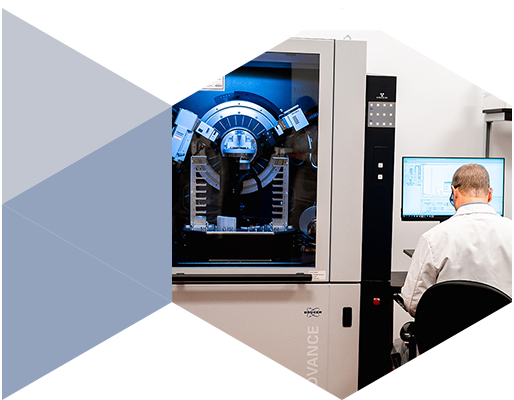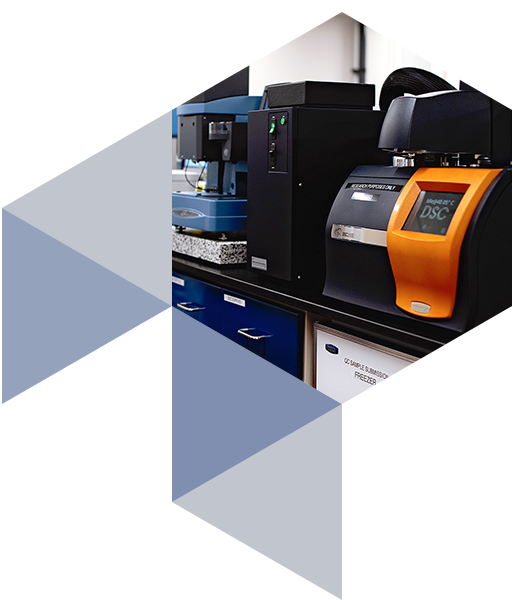Solid State Chemistry
Regis Technologies offers Solid State Chemistry services to provide salt, cocrystal, and polymorph screening and selection activities in order to provide suitable crystallization processes during all development phases. Solid State Chemistry Director, Ron Mueller, Ph.D., has developed a dedicated lab with state-of-the-art equipment for a team of experienced solid state chemists and is now accepting projects.


Learn More
Regis Custom Pharma partners with pharmaceutical and biotechnology companies to advance their high-value intermediates and active pharmaceutical ingredients (APIs) from initial process development and scale up through process validation and commercial manufacturing. APIs (organic molecules) have a propensity to crystallize in different solid state forms. Understanding and knowledge of these forms can establish robust API and formulation processes, mitigate risks and minimize problems, and ultimately reduce development timelines.
Small molecule drug substances, when in the solid phase, could exist in different molecular arrangements and/or conformations within the crystalline lattice. These solid state forms are called polymorphs and exhibit polymorphism. Most organic molecules have the propensity to exhibit polymorphism. Drug substances with no molecular order in the solid phase are considered amorphous. They may also contain solvents and/or water in stoichiometric or non-stoichiometric amounts. These forms are also considered polymorphs of that drug substance. In the truest sense, polymorphs have the same molecular composition with different crystalline arrangements.
Different polymorphs have different physicochemical properties, e.g., spectroscopic, surface chemistry (solubility and stability), crystal habit or morphology (particle shape), packing, kinetic, thermodynamic, mechanical, etc. Sometimes these solid state properties may affect dissolution (a solid dissolving into a liquid medium) and/or bioavailability (i.e. the proportion of a drug in the body that has a physiological effect) of a drug product. Chemical and/or physical properties of the API known to affect the physiological and/or pharmacological activity of a drug product require specific tests along with appropriate specifications for drug substances and/or products to ensure the safety and efficaciousness of the drug products.
Since different polymorphs have different physicochemical properties, identifying a viable polymorph early during the drug development process reduces time to market and costs. Knowledge about the drug substance and drug product increase cumulatively during the development phase of the drug. By the time of the NDA or ANDA submission, the following must be known about the solid state properties of an API: (1) whether it exhibits polymorphism, (2) do multiple polymorphs exist and do the undesired polymorphs affect dissolution and/or bioavailability, and (3) whether various particle size distributions of the material influence dissolution and/or bioavailability of the drug product. Information about all polymorphs, including solid state properties, relevant to the manufacturing process of the drug substance and drug product must be understood. If required, appropriate tests and specifications for relevant polymorphs must be established for the drug substance and/or drug product.
If an API does exhibit polymorphism, it is critical to understand if the undesired polymorphs adversely affect dissolution and/or bioavailability of the desired polymorph. It is also important to understand if there is any potential that the desired polymorph would change during manufacturing and/or storage of it, e.g., different polymorph, particle size distribution and/or chemically. Identifying the most thermodynamically stable polymorph is routinely the objective for Solid State Chemistry screening activities.
Solid State Chemistry Requirements Throughout CMC Development
Since different polymorphs have different physicochemical properties, identifying a viable polymorph early during the drug development is essential. By end of Phase II, knowledge about the solid state form should be provided to the FDA including the propensity to exhibit polymorphism along with other physicochemical data. Regis can help you through the drug development process by building knowledge about your solid state forms which ultimately can establish robust API/formulation processes, mitigate risks, minimize problems, and ultimately reduce development timelines.
Watch our video presented by Ron Mueller, Ph.D.
Services
- Materials Characterization
- Screens and Selection Studies for Polymorphs, Salts, and Cocrystals
- Crystallization Process Development
- Technical Assessments and Consultation
- Method Development & Qualification
Characterization Capabilities
- Differential Scanning Calorimetry
- X-Ray Powder Diffraction (XRPD) with variable temperature capabilities
- Thermalgravimetric Analysis
- Polarized Light and Hot-stage Microscopy
- Dynamic Vapor Sorption
- Fourier-transform infrared spectroscopy (FTIR) capabilities
- External partnerships to enhance Regis’ offerings
Contact Us
Let Regis help take your project to the next level. To partner with Regis or to learn more about our expertise and experience, please contact a Regis Business Development Executive. When you're ready for the next step, your Business Development Executive can provide a Confidential Disclosure Agreement.
To learn more about attending a live talk or virtual seminar, subscribe to our Events mailing list.

Learn More
Regis Custom Pharma partners with pharmaceutical and biotechnology companies to advance their high-value intermediates and active pharmaceutical ingredients (APIs) from initial process development and scale up through process validation and commercial manufacturing. APIs (organic molecules) have a propensity to crystallize in different solid state forms. Understanding and knowledge of these forms can establish robust API and formulation processes, mitigate risks and minimize problems, and ultimately reduce development timelines.
Small molecule drug substances, when in the solid phase, could exist in different molecular arrangements and/or conformations within the crystalline lattice. These solid state forms are called polymorphs and exhibit polymorphism. Most organic molecules have the propensity to exhibit polymorphism. Drug substances with no molecular order in the solid phase are considered amorphous. They may also contain solvents and/or water in stoichiometric or non-stoichiometric amounts. These forms are also considered polymorphs of that drug substance. In the truest sense, polymorphs have the same molecular composition with different crystalline arrangements.
Different polymorphs have different physicochemical properties, e.g., spectroscopic, surface chemistry (solubility and stability), crystal habit or morphology (particle shape), packing, kinetic, thermodynamic, mechanical, etc. Sometimes these solid state properties may affect dissolution (a solid dissolving into a liquid medium) and/or bioavailability (i.e. the proportion of a drug in the body that has a physiological effect) of a drug product. Chemical and/or physical properties of the API known to affect the physiological and/or pharmacological activity of a drug product require specific tests along with appropriate specifications for drug substances and/or products to ensure the safety and efficaciousness of the drug products.
Since different polymorphs have different physicochemical properties, identifying a viable polymorph early during the drug development process reduces time to market and costs. Knowledge about the drug substance and drug product increase cumulatively during the development phase of the drug. By the time of the NDA or ANDA submission, the following must be known about the solid state properties of an API: (1) whether it exhibits polymorphism, (2) do multiple polymorphs exist and do the undesired polymorphs affect dissolution and/or bioavailability, and (3) whether various particle size distributions of the material influence dissolution and/or bioavailability of the drug product. Information about all polymorphs, including solid state properties, relevant to the manufacturing process of the drug substance and drug product must be understood. If required, appropriate tests and specifications for relevant polymorphs must be established for the drug substance and/or drug product.
If an API does exhibit polymorphism, it is critical to understand if the undesired polymorphs adversely affect dissolution and/or bioavailability of the desired polymorph. It is also important to understand if there is any potential that the desired polymorph would change during manufacturing and/or storage of it, e.g., different polymorph, particle size distribution and/or chemically. Identifying the most thermodynamically stable polymorph is routinely the objective for Solid State Chemistry screening activities.
Services
- Materials Characterization
- Screens and Selection Studies for Polymorphs, Salts, and Cocrystals
- Crystallization Process Development
- Technical Assessments and Consultation
- Method Development & Qualification
Characterization Capabilities
- Differential Scanning Calorimetry
- X-Ray Powder Diffraction (XRPD) with variable temperature capabilities
- Thermalgravimetric Analysis (TGA)
- Polarized Light and Hot-stage Microscopy
- Dynamic Vapor Sorption
- Fourier-transform infrared spectroscopy (FTIR) capabilities
- External partnerships to enhance Regis’ offerings
Contact Us
Let Regis help take your project to the next level. For more information about our expertise and experience, please contact us. When you're ready for the next step, your Business Development Executive can provide a Confidential Disclosure Agreement.
To learn more about attending a live talk, or virtual seminar, subscribe to our Events mailing list.
Request for Information
Rely on our expertise to accelerate your project from preclinical to commercialization, fast. Connect with our team and learn how we can help expedite your project to the next phase.
